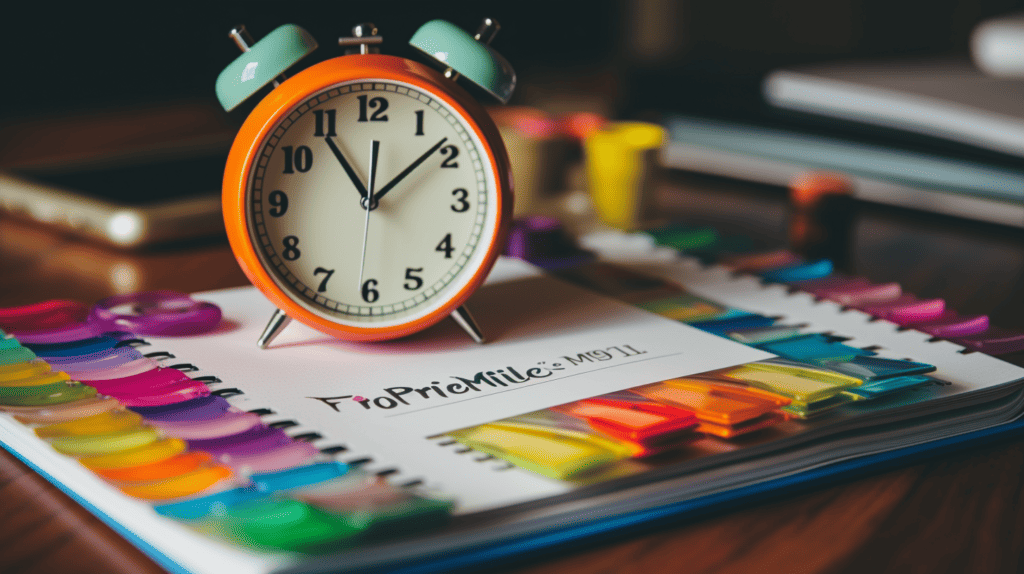As a professional, good time management is an essential skill to possess. However, it can be challenging to evaluate our time management effectiveness objectively. That’s where time management assessment comes in. By measuring our time management abilities, we can identify areas for improvement and implement effective strategies for better productivity and work-life balance.
In this section, I’ll be exploring the importance of how to assess time management skills and providing top tips and techniques for effective evaluation. Let’s get started!
Key Takeaways:
- Assessing time management skills is crucial for personal and professional development.
- By measuring our time management abilities, we can identify areas for improvement and implement effective strategies for better productivity and work-life balance.
- In this section, we’ll explore the importance of assessing time management skills and provide top tips and techniques for effective evaluation.
Why Assessing Time Management Skills is Important
As someone who values productivity and efficiency, I know the benefits of effective time management firsthand. However, it’s important to recognize that time management is a skill that requires continuous improvement and evaluation.
Assessing time management effectiveness can provide valuable insights into areas for improvement and lead to enhanced productivity and success in both personal and professional settings.
When evaluating time management strategies, it’s crucial to consider factors such as task prioritization, time allocation and productivity, distraction management, goal setting and meeting deadlines, and stress levels. By assessing these areas, individuals can gain a comprehensive understanding of their time management skills and identify specific areas for enhancement.
Additionally, evaluating time management skills can provide valuable feedback for employees and help organizations improve productivity and efficiency. This assessment can be used to identify potential training opportunities and develop strategies for enhancing employee performance.
Overall, assessing time management skills is a crucial aspect of personal and professional development. By evaluating and improving time management effectiveness, individuals can unlock their potential for productivity and success.
Self-Reflection: The First Step in Assessing Time Management Skills
When it comes to assessing time management skills, self-reflection is a vital first step. Taking the time to reflect on your own habits and behaviors can provide valuable insight into areas of strength and weakness in your time management abilities. Here are some techniques for measuring your own time management skills:
- Journaling: Keep a daily log of your activities and the time spent on each task. This can help identify patterns in your time management and areas where you may need to improve.
- Self-Assessment Exercises: There are numerous online resources available that offer time management self-assessment exercises. These can help you identify areas where you may need to focus your attention.
- Reflection Prompts: Take some time to reflect on your day or week and ask yourself questions such as: What did I accomplish? What tasks took longer than expected? How could I have managed my time more effectively?
By incorporating these techniques into your daily routine, you can gain a better understanding of your time management strengths and weaknesses. This self-reflection can be used as a starting point for developing a plan to improve your time management skills.

Using Time Tracking Tools for Evaluation
Time tracking tools are a great way to assess your time management skills. By understanding how you spend your time, you can identify areas where you need to make improvements. There are several different types of time tracking tools available, including:
| Type of Tool | Description |
|---|---|
| Manual Time Tracking | This involves manually recording the time spent on tasks throughout the day. This can be done with a spreadsheet, notebook, or time tracking app. |
| Automatic Time Tracking | This involves using an app or software that automatically records your computer or phone activity. This is useful for tracking time spent on specific apps or websites. |
When using time tracking tools, it’s important to choose one that works for you and fits your needs. Here are some tips for using time tracking tools effectively:
- Record your time consistently: To get an accurate picture of how you spend your time, it’s important to record it consistently throughout the day.
- Be honest: It can be tempting to inflate the time you spend on tasks or reduce the time you spend on distractions, but this will only give you an inaccurate picture of your time management skills.
- Review your data regularly: Take time to review your time tracking data regularly. This will help you identify patterns and areas where you need to make improvements.
Tip: Use time tracking tools in combination with other assessment techniques for a more comprehensive evaluation of your time management skills.
Assessing Task Prioritization and Planning
Having strong task prioritization and planning skills is essential for effective time management. In order to accurately assess these skills, there are a few techniques I often use:
- Time-blocking: I break down my day into blocks of time dedicated to specific tasks. This allows me to prioritize my most important tasks and focus on completing them during the designated time frame.
- Creating to-do lists: I list out all the tasks I need to complete and prioritize them based on urgency and importance. This helps me stay organized and ensures I don’t forget any important tasks.
- Using the Eisenhower Matrix: This is a tool that helps me divide tasks into four categories: urgent and important, important but not urgent, urgent but not important, and neither urgent nor important. This helps me prioritize tasks more effectively.
By using these techniques, I can assess my ability to prioritize tasks and create efficient plans. It also helps me identify any areas for improvement in my task prioritization and planning skills.

Analyzing Time Allocation and Productivity
How we allocate our time greatly impacts our time management abilities. The key to effective time allocation is to make sure that the time we spend is proportional to its importance. Evaluating our productivity levels can help us identify areas where we can improve our time allocation.
One useful technique is to track your time using a time log. This involves recording how you spend your time over a certain period, such as a week. This can help you identify time wasters and areas where you are spending too much or too little time. It can also help you identify patterns and opportunities for improvement.
Another technique is to use productivity tools. These tools can help you prioritize tasks, set deadlines, and track your progress. One such example is the Pomodoro technique, which involves breaking work into 25-minute intervals, separated by short breaks. This can help you stay focused and avoid procrastination.
It’s important to remember that everyone’s productivity levels are different, and what works for one person may not work for another. The key is to identify techniques that work for you and stick to them.
Assessing Distraction Management
As someone who struggles with focusing on tasks, I understand how distractions can affect time management. To effectively assess this skill, it’s important to identify common distractions and how you manage them.
One technique is to keep a distraction log for a few days, noting every time you get sidetracked from work and what caused it. This will help you identify patterns and the types of distractions that are most problematic for you. You can then take steps to eliminate or reduce these distractions.
Another way to assess your distraction management is to use time tracking tools that also monitor app and website usage. By reviewing the data, you can see how much time is spent on non-work-related tasks and take action to limit access to these distractions during work hours.
Ultimately, managing distractions is about building good habits and minimizing temptation. Tools like noise-canceling headphones, website blockers, and task lists can help you stay focused and minimize the impact of distractions on your productivity.

Evaluating Goal Setting and Deadlines
Setting clear goals and meeting deadlines is essential for effective time management. To assess my ability to manage these tasks, I start by reviewing my current goals and deadlines. I make a list of all the tasks I need to complete and the corresponding deadlines.
Then, I evaluate the effectiveness of my goal-setting techniques by looking at how achievable and specific my goals are. I also consider whether my goals are aligned with my long-term objectives.
To evaluate my ability to meet deadlines, I reflect on my past performance and consider any instances where I missed a deadline or completed a task in a rush because of poor planning. I try to identify any patterns or common mistakes that I can learn from in the future.
To improve my goal setting and deadline management skills, I use the SMART technique. I ensure that my goals are Specific, Measurable, Achievable, Relevant, and Time-Bound. I also use a planner or scheduling app to keep track of my deadlines and set reminders to ensure that I stay on track.
Seeking Feedback and Input
One of the best ways to evaluate your time management skills is by seeking feedback and input from others. This can include peers, mentors, and supervisors who can provide valuable insights that you may not have considered.
To gather feedback, consider asking specific questions related to your time management skills. For example, you could ask:
Do you think I am effective in managing my time?
Or you could ask for feedback on a specific task or project:
“How do you think I could have better managed my time during the last project?”
Be open-minded to feedback and avoid becoming defensive or taking criticism personally. Instead, use the feedback as a learning opportunity to identify areas for improvement.
You can also seek input from others by observing how they manage their time. This can provide new ideas and insights that you can incorporate into your own time management strategies.
Assessing Stress and Burnout Levels
As a copywriting journalist, I often find myself juggling tight deadlines and working long hours. This can easily lead to stress and burnout, impacting my time management skills and overall productivity.
To assess your stress and burnout levels, start by taking a step back and reflecting on your work habits. Do you find yourself constantly working without taking breaks? Are you feeling overwhelmed by the workload? These are signs that you may be experiencing burnout.
You can also use self-assessment exercises to evaluate your stress levels. For example, ask yourself if you’re feeling irritable or easily frustrated, or if you’re having trouble sleeping. These can all be indicators of high stress levels.
To manage stress and prevent burnout, try implementing strategies like mindfulness meditation, exercise, or taking regular breaks throughout the day. Prioritizing self-care can help you maintain focus and improve time management skills.
Remember, stress and burnout can greatly impact your time management abilities. By taking steps to manage stress levels, you can improve overall productivity and enhance your time management skills.

Identifying Areas for Improvement and Setting Goals
After assessing my time management skills, I can now identify areas in which I need to improve. By setting goals and creating an actionable plan, I can enhance my productivity and achieve better results.
One area for improvement is minimizing distractions. I plan to use the techniques discussed in Section 7 to effectively manage distractions and stay focused on my priorities. Additionally, I want to improve my task prioritization and planning skills by implementing the tips provided in Section 5.
Another area for improvement is stress management. As discussed in Section 10, stress and burnout can impact my time management skills. I plan to incorporate stress-reducing techniques and mindfulness practices into my daily routine to maintain optimal productivity levels.
By analyzing my assessment results, I can create specific and measurable goals to enhance my time management skills. For example, I aim to prioritize my daily tasks more efficiently, resulting in an increase in overall productivity by 25% in the next quarter. By setting realistic and achievable goals, I can improve my time management strategies and ultimately achieve success.
Conclusion on How To Assess Time Management Skills
Assessing my time management skills is crucial for my personal and professional development. By implementing the tips and techniques discussed in this article, I can gain valuable insights into my time management abilities and unlock my potential for productivity and success.
As I have learned, evaluating my time management effectiveness and strategies involves self-reflection, utilizing time tracking tools, assessing task prioritization and planning, analyzing time allocation and productivity, managing distractions effectively, evaluating goal setting and deadlines, seeking feedback and input, and identifying areas for improvement and setting goals. These steps will not only help me to manage my time more efficiently but also reduce stress and burnout levels.
By making a conscious effort to assess and improve my time management abilities, I can enhance my productivity, increase my efficiency, and achieve better work-life balance. I am excited to implement these techniques and see the positive results in my personal and professional life.
FAQ on How To Assess Time Management Skills
Q: How important is it to assess time management skills?
A: Assessing time management skills is crucial for personal and professional development. It allows you to gain insights into your abilities and identify areas for improvement.
Q: Why is assessing time management skills important?
A: Evaluating time management skills helps to understand their effectiveness and evaluate the strategies being used. It helps in optimizing productivity and achieving goals.
Q: How can I assess my own time management skills?
A: Self-reflection is the first step in assessing time management skills. Techniques like self-assessment exercises and reflection prompts can help measure your abilities.
Q: How can I use time tracking tools for evaluation?
A: Time tracking tools are effective for assessing time management skills. This section explores different types of tools available and how to leverage them effectively.
Q: How can I assess task prioritization and planning?
A: Task prioritization and planning are crucial for effective time management. This section provides techniques to assess and improve your ability in these areas.
Q: How can I analyze time allocation and productivity?
A: Time allocation and productivity greatly impact time management skills. This section discusses methods for analyzing these factors to evaluate and enhance your abilities.
Q: How can I assess distraction management?
A: Distractions can affect time management. This section explores techniques for assessing and improving your ability to manage distractions and maintain focus.
Q: How can I evaluate goal setting and meeting deadlines?
A: Setting goals and meeting deadlines are important for effective time management. This section provides tips for evaluating your techniques and assessing your performance.
Q: How can I seek feedback and input for time management assessment?
A: Obtaining feedback from others can provide valuable insights. This section discusses techniques for seeking feedback and incorporating input from peers, mentors, and supervisors.
Q: How can I assess stress and burnout levels?
A: Stress and burnout can impact time management. This section explores techniques to assess and manage stress levels for optimal time management skills and well-being.
Q: How can I identify areas for improvement and set goals?
A: After assessing your time management skills, it’s important to identify areas for improvement and set goals. This section provides guidance on analyzing assessment results and creating an action plan.





Leave a Reply